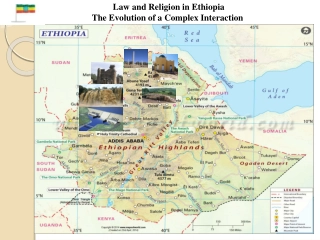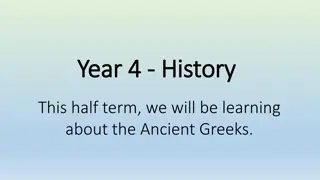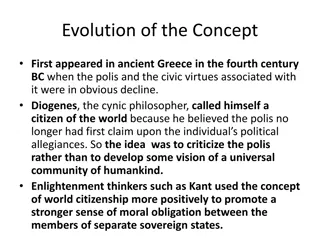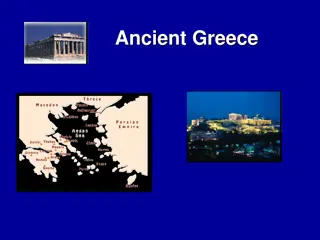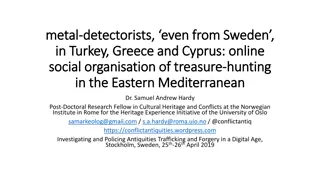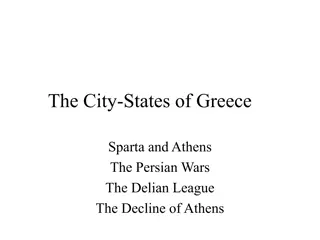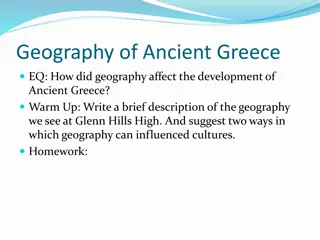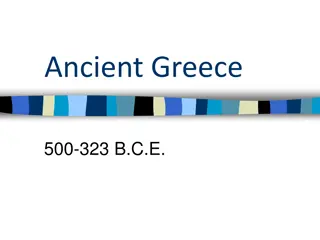Interactions Between Ancient Greece and Ethiopia: A Historical Overview
Ancient Greece and Ethiopia had significant interactions throughout history. The relationship started with trade and the employment of Greek mercenaries by the Egyptian rulers. Greeks were intrigued by rumors about Ethiopians, leading to explorations and interactions. This period ended with Alexander the Great's conquest of Egypt. Ethiopia was known for its ivory trade, and there were mentions of Aethiopians in ancient texts. The Greeks and Romans were fascinated by the mysterious remote lands of Ethiopia.
Download Presentation

Please find below an Image/Link to download the presentation.
The content on the website is provided AS IS for your information and personal use only. It may not be sold, licensed, or shared on other websites without obtaining consent from the author. Download presentation by click this link. If you encounter any issues during the download, it is possible that the publisher has removed the file from their server.
E N D
Presentation Transcript
Ethiopia and Ancient Greece Tilly, Cameron & Ajay
Overview A brief history of how Greece and Ethiopia first came to interact Accounts of trade Examples of Ethiopians in the Greek imagination
Greek and Ethiopian interaction: a history Before the Greeks, the Egyptians had maintained a relationship with the Meroitic Ethiopians, welcoming members of the nobility and royal family into the Alexandrian Court and educating some in Greek, making communication with the Greeks possible There is no evidence to prove that Greek real knowledge of Egypt during the eighth or seventh centuries BC was more than vague memories preserved from Cretan or Mycenaean civilizations, rather than newly acquired knowledge (Shavit, 2001, 66). Disregarding Homer s somewhat mythologised early account the Ethiopians, the first significant Greco-Ethiopian interaction is traceable back to the employment of Ionian and Carian mercenaries in lower Egypt sometime in the mid-7th century BCE Most notably amongst those recruiting them were the Sai te rulers of the Twenty- sixth Dynasty who relied on Greek soldiers in their Delta civil war
This began the first of two periods of interaction between the two cultures that would end with Alexander s conquest of Egypt Based primarily in the Delta (lower Egypt), the settlements the Greeks established would have had easy access to the Ethiopians, about whom they came to hear many rumours from the Egyptians, sparking the original interest that would lead them to investigate and explore the African interior The remote land of the Upper Nile ... captured the romantic imagination of Greeks and Romans as it never did that of the Egyptians (Adams, 1977, 1). This period of interaction came to an end upon Alexander the Great s conquest of Egypt in 332 BCE, by which time Egypt had become heavily Hellenised and there no longer existed the restraint of distance
Ethiopian Trade Into it is brought all the ivory from beyond the Nile and from there down to Adulis. The mass of elephants and rhinoceroses that are slaughtered all inhabit the upland regions, although on rare occasions they are also seen along the shore around Adulis itself. Periplus of the Erythraean Sea, section 4 The area exports: a great amount of ivory but inferior to that from Adulis Periplus, section 17
Aethiopians who are called Auxomitae, because their king resides in the city of Auxomis the harbour of the Homeritae from which they are accustomed to put to sea for the voyage to Aethiopia is called Bulicas; and at the end of the sail across the sea they always put in at the harbour of the Adulitae. History of the Wars, Procopius. 1.19
Ethiopians as Pious Homer Iliad 1.423-4 for Zeus went yesterday for a feast to the blameless Ethiopians at the Ocean, and all the gods followed with him Homer Iliad 23.205-7 (Iris) I may not sit, for I must go back to the streams of Oceanus, to the land of the Ethiopians, where they are sacrificing hecatombs to the immortals, so that I too may share in the sacred feast. Homer Odyssey 1.22-26 But now Poseidon had gone among the far-off Ethiopians the Ethiopians who dwell divided in two, the farthermost of men, some where Hyperion sets and some where he rises there to receive a hecatomb of bulls and rams, and there he was taking his joy, sitting at the feast
Ethiopians as superhuman Herodotus 3.23 The Fish-eaters then in turn asking of the Ethiopian length of life and diet, he said that most of them attained to an hundred and twenty years, and some even to more; their food was boiled meat and their drink milk. The spies showed wonder at the tale of years; whereon he led them, it is said, to a spring, by washing wherein they grew sleeker, as though it were of oil; and it smelt as it were of violets. So light, the spies said, was this water, that nothing would float on it, neither wood nor anything lighter than wood, but all sank to the bottom. If this water be truly such as they say, it is likely that their constant use of it makes the people long-lived. When they left the spring, the king led them to a prison where all the men were bound with fetters of gold. Among these Ethiopians there is nothing so scarce and so precious as bronze.
Ethiopians as powerful but peaceful Herodotus 3.21 These were the men to whom the Fish-eaters came, offering gifts and delivering this message to their king: Cambyses king of Persia, desiring to be your friend and guest, sends us with command to address ourselves to you; and he offers you such gifts as he himself chiefly delights to use. But the Ethiopian, perceiving that they had come as spies, spoke thus to them: It is not because he sets great store by my friendship that the Persian King sends you with gifts, nor do you speak the truth (for you have come to spy out my dominions), nor is your king a righteous man; for were he such, he would not have coveted any country other than his own, nor would he now try to enslave men who have done him no wrong. Now, give him this bow, and this message: The King of the Ethiopians counsels the King of the Persians, when the Persians can draw a bow of this greatness as easily as I do, then to bring overwhelming odds to attack the long-lived Ethiopians; but till then, to thank the gods who put it not in the minds of the sons of the Ethiopians to win more territory than they have. Herodotus 2.137-9 Egypt was invaded by Sabacos king of Ethiopia and a great army of Ethiopians the Ethiopians ruled Egypt for fifty years. It is recorded in the history of his reign that he would never put to death any Egyptian wrongdoer, but sentenced all, according to the greatness of their offence, to raise embankments in the town of which each was a native. Thus the towns came to stand yet higher than before


